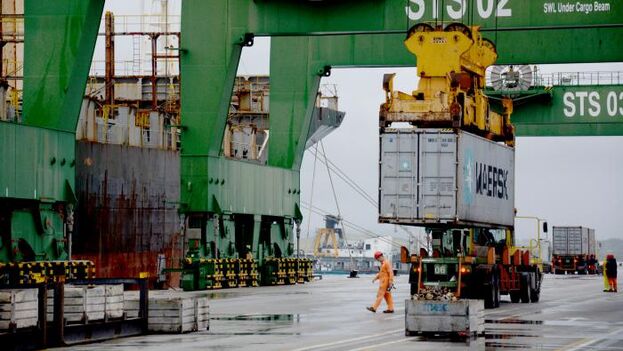
![]() 14ymedio, Madrid, 22 February 2023 — Cuban economist Carola Salas surprised viewers in the program Cuadrando la caja [Squaring the Box], broadcast on Cuban Television, by saying: “We have never really received the amounts promised in foreign investment, which means that something is not going well for us.”
14ymedio, Madrid, 22 February 2023 — Cuban economist Carola Salas surprised viewers in the program Cuadrando la caja [Squaring the Box], broadcast on Cuban Television, by saying: “We have never really received the amounts promised in foreign investment, which means that something is not going well for us.”
The expert participated in a program together with her colleagues Antonio Romero who, like Salas, belongs to the Center for Research on the International Economy, and Jorge Casals, of the Center for Research on International Policy of the Ministry of Foreign Relations. The program was dedicated to the insertion of the Island’s economy into the international panorama, and was broadcast on February 5. The program received low ratings but acquired greater importance when the official press published the transcript of the discussion on Tuesday [partially in English here].
The expert’s statement came at a time in the conversation when there was talk of financing to structurally change the national economy, a need that was expressed on several occasions during the debate. Salas noted that foreign investment has become indispensable since the 1990s and that, although it has improved a lot, “the amounts are still insufficient and the commitments that are generated are not fundamentally fulfilled.”
In addition, he urged emigrants to participate in the “development” of their country by financing enterprises. “[It] can generate something that is widely used in the world, which is the interest that a citizen who lives elsewhere in the world can have with his land, with his country of origin (…) and can then invest his money in something that implies an improvement of relations,” he suggested, emphasizing the multiple appeals that the Cuban Government has made in these years to encourage exiles.
The experts, in a program led by Rafael Montejo, began their discussion with a conscientious description of how the Cuban economy developed internationally since 1959, specifically within the Soviet camp, and how the situation broke down after the fall of the Berlin Wall. Experts are clear about the first cause of the current problems, aside from the ‘blockade’ [i.e. American embargo]: the departure of the Island from international financial organizations, promoted by Fidel Castro in 1964 with the departure from the International Monetary Fund and, later, of the World Bank. The leader of the Revolution was also the main promoter in advocating that Third World countries not pay their debts.
Today they are experiencing the consequences, the experts now agree — although without blaming anyone. “That non-participation in international financial organizations prevents us from having a lender of last resort (…). It limits our ability to access international credits, and it raises the country’s risk to very important levels, to the point of being at the limit for divestment,” Salas summarizes.
The specialist notes that the vast majority of countries have foreign debt, but they can face it through this type of credit, either in better or worse conditions. However, Cuba does not even have that last resort, which in turn worsens the situation.
“The repeated breaches of international commitments on foreign debt, apart from hindering and lowering the country’s financial credibility, discourage investments,” he adds. The resources that the Island uses, with the lack of lenders, are discounted payments on the nominal value, the creation of funds, the exchange for investments, the conversion of debt amounts into national currency, and the issuance of bonds or debt bonds with sovereign guarantees, he mentions.
During the talk, the Island’s main trading partners are mentioned, all of them expected. According to Antonio Romero Gómez, five countries concentrate 60% of all foreign exchange: China, Venezuela, Canada, Spain and a fifth that depends on the moment and that has sometimes been Brazil. “And another country has arisen,” he adds without revealing what it is.
Cuban economists agree that it is necessary for the Island to take advantage of two areas specifically, and among them are neither China, Russia, Turkey, Algeria, nor Iran, the regime’s allies in other latitudes and to whom Miguel Díaz-Canel resorted this December to capture energy and investments. The three experts recommend looking at the nearest countries in the Caribbean and the “opportunities we have in Europe.”
“Obviously we have to transform our economic structure,” repeated Casals Llano, who, like his colleagues, believes that Cuba has become — and must accentuate its evolution — a service economy; and that the international trade industries that were once its engine of growth today are considered of little added value, in addition to having lost their primacy.
The three sectors that economists trust for development are biotechnology, the medical-pharmaceutical industry, and tourism, which should be renewed “totally under other new conditions.” Although the sale of medical services is still the most profitable position, they also agreed that computing and software have enormous potential in Cuba, where many young people already develop countless interesting applications, although they warn that they must be encouraged so that they do not migrate.
Romero Gómez closed the program with a pessimistic prediction and a cry, that, according to him, is falling on deaf ears. “I think we’re going to have a complex, very difficult year in 2023. We have to change the ways of driving our economy. I think we are going to have changes that are essential, that economists have been saying for a long time.”
Translated by Regina Anavy
____________
COLLABORATE WITH OUR WORK: The 14ymedio team is committed to practicing serious journalism that reflects Cuba’s reality in all its depth. Thank you for joining us on this long journey. We invite you to continue supporting us by becoming a member of 14ymedio now. Together we can continue transforming journalism in Cuba.
